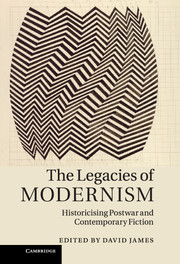Book contents
- Frontmatter
- Contents
- Notes on contributors
- Acknowledgements
- Introduction: mapping modernist continuities
- Part I Early legacies: inheriting modernism at mid century and beyond
- Part II Modernist aesthetics in transition: character, perception, innovation
- Chapter 4 Thinking in literature: modernism and contemporary neuroscience
- Chapter 5 Autonomous automata: opacity and the fugitive character in the modernist novel and after
- Chapter 6 Pseudo-impressionism?
- Chapter 7 ‘Advancing along the inherited path’: Milan Kundera, Philip Roth and the idea of being traditionally new
- Part III Reassessing the ethics of modernist fiction
- Part IV Modernism's global afterlives
- Epilogue Finding the dreadfully real
- Index
- References
Chapter 5 - Autonomous automata: opacity and the fugitive character in the modernist novel and after
from Part II - Modernist aesthetics in transition: character, perception, innovation
Published online by Cambridge University Press: 05 November 2011
- Frontmatter
- Contents
- Notes on contributors
- Acknowledgements
- Introduction: mapping modernist continuities
- Part I Early legacies: inheriting modernism at mid century and beyond
- Part II Modernist aesthetics in transition: character, perception, innovation
- Chapter 4 Thinking in literature: modernism and contemporary neuroscience
- Chapter 5 Autonomous automata: opacity and the fugitive character in the modernist novel and after
- Chapter 6 Pseudo-impressionism?
- Chapter 7 ‘Advancing along the inherited path’: Milan Kundera, Philip Roth and the idea of being traditionally new
- Part III Reassessing the ethics of modernist fiction
- Part IV Modernism's global afterlives
- Epilogue Finding the dreadfully real
- Index
- References
Summary
Rainer Maria Rilke loved dolls, marionettes and puppets of all kinds. A poet might ‘succumb to the domination of a marionette, for the marionette has . . . imagination’. Dolls have no imagination, but in their waxen appearance lies a ‘superiority . . . a stagnant ecstasy’. Even rocking horses find favour, as he exalts the ‘great, courageous soul of the rocking horse’. However, it is marionettes and puppets that assert themselves the most; ‘you may not’, he said, ‘make what you like out of a puppet . . . like works of art, they also stand one degree above things’. They have ‘a strangely personal soul, which is often accessible to us, but oftener still resists our whims’. Not being able to ‘make what you like’ out of a creation is, we might imagine, for the artist, a sort of failure. That the puppets might retain a resistant, ‘personal’, hermetic, yet sometimes inaccessible soul displays a defiance that is disturbing to us. Yet in this very recalcitrance lies ontological integrity; standing ‘one degree above things’, the refusal of the puppets to be appropriated signals a degree of independence from their creator.
Automata share a basic status with puppets, though on account of their more obvious dependence on extrinsic operation puppets tend to stand figuratively as that which is will-less, inanimate, manipulable. The Greek word automaton means, literally, ‘self-moved’: automata are objects that need no outside assistance to assume animation. Automaton was one of Aristotle's two models of chance (along with tyche), and automata, like chance events, come to existence spontaneously: they are viviparous, capable of independence; they are, as Leland Monk has it, ‘self-caused’. This independence and vitality, the autonomy of automata, I offer as an analogue for the autonomy of fictional creations. The automata's spontaneity, their sua sponte (free will) is of course contradictory: although the movement is self-generated, that generation is obviously faked; the inspiritedness of automata is necessarily simulated, just as a fictional character's must be. Authors have long spoken about characters spontaneously living outside their conscious control, of characters who do not do what their creators tell them to, whose inner life is accessible to them only in part, and it is an enduring fantasy amongst both consumers and producers of literature that fictional characters, like Rilke's puppets, exist. Negotiating the possibility of the construction of an autonomous character, some modernist authors introduce a degree of opacity to their inventions: an inaccessibility, or a refusal to be easily known that in narrative terms equates to a refusal to be written. This, I will argue, represents a tentative independence: the articulation of a self that is other than that of the author. The recurring use of incomprehensibility in terms of depictions of individual subjects is a way of maintaining a narrative version of, and manifesting some writers' vision of, a kind of privacy. To gesture towards a character's privacy, their occlusions, their furtiveness, their fugitive tendencies, is to acknowledge that sua sponte is identical with incomprehensibility.
- Type
- Chapter
- Information
- The Legacies of ModernismHistoricising Postwar and Contemporary Fiction, pp. 96 - 113Publisher: Cambridge University PressPrint publication year: 2011



